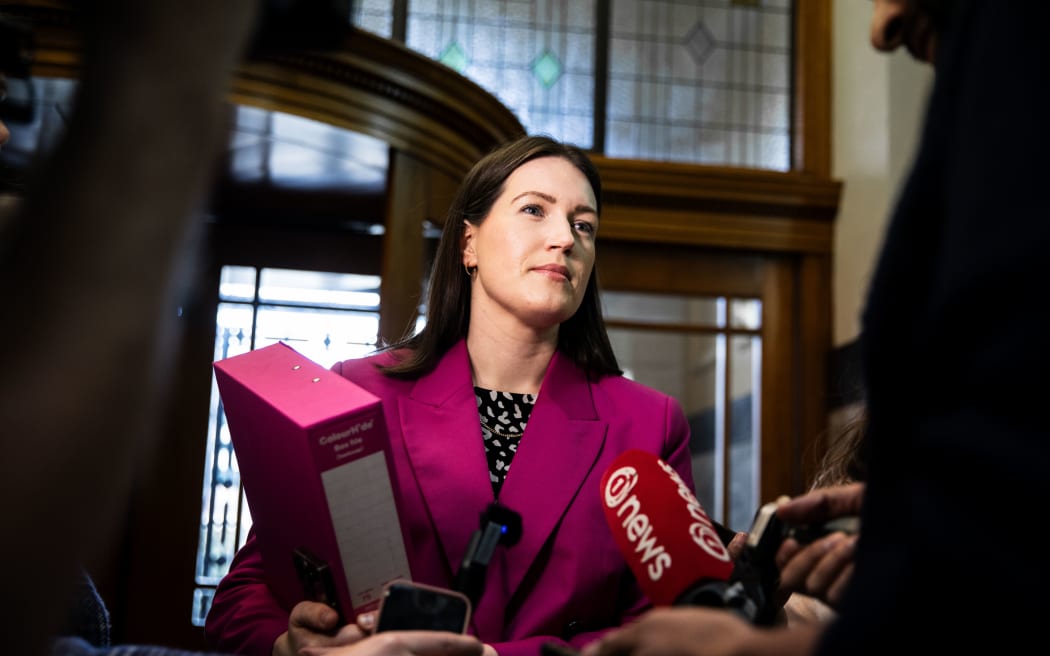
Photo: RNZ / Samuel Rillstone
Minimum wage workers are due to get a real-terms pay cut.
It was announced on Tuesday that the minimum wage will rise by 1.5 percent to $23.50 from April 1. It is the smallest in dollar terms since 2013, and the smallest percentage increase since the 1990s.
Tuesday's announcement follows a 2 percent increase in April this year that saw the minimum wage rise from $22.70 to $23.15 an hour.
Training wages and starting wages will increase to $18.80, remaining at 80 percent of the minimum wage for adults.
NZCTU policy director Craig Renney said it was "barely an increase".
"We've calculated that a full-time minimum wage worker will be $235 a year worse off in real terms. This is the second year in a row that we've had a below-inflation increase. In real terms, over the two decisions of Brooke van Velden workers will be $1206 a year worse off."
Infometrics chief executive Brad Olsen said despite the small increase by historic standards, the minimum wage was still higher than it would be if it had lifted with the rate of inflation since 2020.
"Over that five-year period, the minimum wage will have increased 24.3 percent, and inflation is expected to have increased around 22.8 percent - put another way, if the minimum wage had increased by inflation since 2020, in 2025 it would be sitting around 30c lower, at $23.20, rather than the set $23.50."
But Renney said that was a reflection of the starting point. "It was so badly put up by National through their term of office, it fell behind."
To keep up with the inflation of the last two years, the rate should be $24.08, he said. "Those workers with the fewest choices, those on very low incomes, we're effectively reducing their real take-home salary. According to MSD research, 61 percent of households where children live in poverty live in households where there is some work. This makes that worse."
Olsen said it seemed likely a lower rate of increase would be the pattern of the next few years.
"Under the current government, the minimum wage has increased by 40c/hour over the two minimum wage decisions made so far, slightly below the 42c/hour average for the Key-era.
"Under Helen Clark, minimum wage increases averaged around 56c/hour, although that was a lot more at the time given the lower starting point, and the average across Ardern-Hipkins was $1.16/hour. In 2026, the minimum wage would need to increase by 50c (to $24.00) to match expected inflation."
The Employers and Manufacturers Association said the decision had given employers time to prepare.
Head of advocacy Alan McDonald said the increase reflected the economic climate and labour market conditions.
"While we support this modest increase, we continue to advocate for a more predictable and stable approach, such as an index-linked method, to future wage increases," he said.
"In the past, significant increases have often been announced with little notice and businesses have been left scrambling to adjust their budgets and payroll systems.
"The government's early announcement of this modest increase will give businesses time to prepare. In the past we've seen sharp increases at short notice and that can be an unexpected burden for businesses, especially when they are already grappling with rising costs.
"New Zealand currently has a relatively high minimum wage compared with other key OECD countries."
Stats NZ data shows in the year to September, all salary and wage rates lifted 3.8 percent.
Sign up for Ngā Pitopito Kōrero, a daily newsletter curated by our editors and delivered straight to your inbox every weekday.





